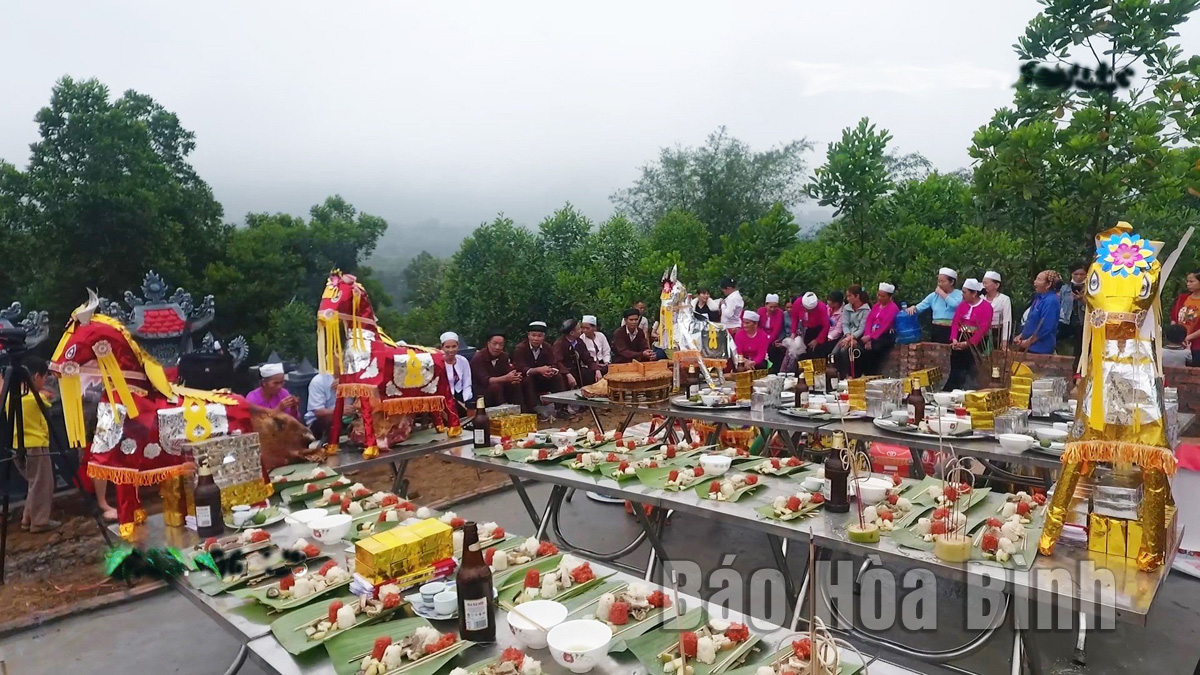(HBO) – According to historical records, the Cold Food Festival of China entered Vietnam during the Ly Dynasty (1009 - 1225), but it has been adapted to the traditions, customs, and beliefs of each locality and ethnic group and called Thanh minh Festival. "Thanh minh” is the fifth of the 24 solar terms. "Thanh” means purity while "minh” brightness. On this occasion, people often visit, clean, and repair graves of their clans and give offerings to express gratitude to ancestors.
Vegetarian food offered to ancestors at a ritual of the Muong ethnic people in Muong Ha hamlet of Dinh Cu commune, Lac Son district.
This year, the Thanh minh Festival lasted from April 5 (the 15th day of the second lunar month) to April 20 - 21. In Lac Son district of Hoa Binh province, more than 90% of the local population is Muong ethnic people, most of whom do not hold ceremonies to mark the death anniversaries of ancestors or practice ancestor worship at home. Each clan or group of families buries the deceased in a common area of graves and visits graves twice a year.
The first time is made by the end of a year, about the 23rd - 27th days of the last lunar month. On this day, each family sends a member to clean the entire area of graves and then cut a bamboo, "lanh anh”, or any plant with a node-divided stem near the area to erect a "neu” pole and invite ancestors to join their descendants to celebrate the Lunar New Year.
The second time takes place during the Thanh minh Festival. Depending on each clan or group of families, people choose a believed-to-be good day to hold rituals, usually in late the second or early the third lunar month. Unlike the grave-visiting occasion by the year’s end, on this day, families contribute offerings to hold a joint ceremony to worship ancestors at the grave area. The entire area is cleaned up before the ceremony.
Offerings include steamed glutinous rice, boiled chicken, grilled fish, betel and areca, incense, water, and rice alcohol. In their prayers, people invite ancestors and the local tutelary god to enjoy the food and pray for good health, peace, and prosperity for all. At the same time, the oldest who has the best memory in the clan will come to each grave and tell descendants about details of each ancestor.
After the ceremony, people will eat the food offered to ancestors besides the grave area and when returning home, they will gather in a family meal to talk and review the past year.
Artisan Bui Van Minh, head of the Mo Muong Club of Lac Son district, said that the Thanh minh Festival is a highly important, sacred, and meaningful event of Muong people, only after the Lunar New Year Festival.
Nowadays, thanks to better living conditions, locals have organised the Thanh minh celebrations more carefully. All people in a clan or group of families also reunite, making this occasion more joyful, he noted.
As Muong people do not hold celebrations of death anniversaries or worship ancestors at home, the Thanh minh Festival holds great importance to them. This is an occasion to them to express gratitude to ancestors. The maintenance of this traditional customs is necessary for helping preserve and bringing into play the festival’s values in the life of the Muong ethnic group and local residents in general./.



